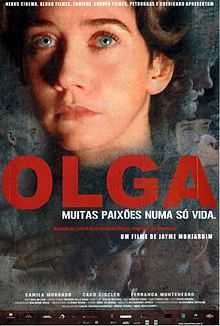Olga (film)
| Olga | |
|---|---|
 Theatrical release poster | |
| Directed by | Jayme Monjardim |
| Produced by |
Caru Alves de Souza Tata Amaral |
| Screenplay by | Rita Buzzar |
| Based on |
Olga by Fernando Morais |
| Music by | Marcus Viana |
| Cinematography | Ricardo Della Rosa |
| Editing by |
Pedro Amorim Beat Morell |
| Studio |
Europa Filmes Globo Filmes Lumière Nexus Cinema e Vídeo |
| Distributed by |
Elo Audiovisual Lumière Europa Filmes |
| Release dates |
|
| Running time | 141 minutes |
| Country | Brazil |
| Language | Portuguese |
| Budget | R$12 million |
Olga is a 2004 Brazilian film directed by Jayme Monjardim. It was Brazil's submission to the 77th Academy Awards for the Academy Award for Best Foreign Language Film, but was not accepted as a nominee.[1][2]
The film was a produced by Nexus Cinema in conjunction with Globo Filmes and Lumiere. Olga was seen by over three million viewers and won more than 20 awards in Brazil and internationally.
Sinopsys
Olga is the compelling feature-film chronicle of the German Jew Olga Benario Prestes’ (1908-1942) life and times. A communist activist since her youth, Olga is persecuted by the Police and flees to Moscow, where she undergoes military training. She is put in charge of escorting Luis Carlos Prestes to Brazil to lead the Communist Revolution of 1935, falling in love with him long the way. With the failure of the Revolution, Olga is arrested alongside Prestes. Seven-month pregnant Olga is deported by President Vargas’ Government to Nazi Germany, where she gives birth to her daughter Anita Leocádia while incarcerated. Separated from her daughter, Olga is sent away to the Ravensbrück concentration camp, where she is executed in the gas chamber.
Cast
- Camila Morgado .... Olga Benário Prestes
- Renata Jesion .... Elise Ewert Sabo
- Caco Ciocler .... Luís Carlos Prestes
- Osmar Prado .... Getúlio Vargas
- Floriano Peixoto ... Filinto Müller
- Fernanda Montenegro .... Dona Leocádia Prestes
- Luís Melo .... Léo Benário
- Anderson Müller .... Paul Gruber
- Murilo Rosa .... Estevan
- Werner Schünemann .... Arthur Ewert
- Guilherme Weber .... Otto Braun
- Mariana Lima .... Lígia Prestes
- Eliane Giardini .... Eugénie Benário
- Jandira Martini .... Sarah
- Milena Toscano .... Hannah
- Klaus Couto .... Adolf Hitler
- Odilon Wagner .... Capitão do navio
- Eliana Guttman .... Enfermeira-Chefe
- Ranieri Gonzalez .... Miranda
- Raul Sr .... Rodolfo Ghioldi
- Bruno Dayrrel .... Victor Barron
- Gilles Gwizdek .... Leon Julles Valee
- Hélio Ribeiro .... Padre Leopoldo
- Edgard Amorim .... Agildo Barata
- Zé Carlos Machado .... Ministro da Guerra
- José Dumont .... Manuel
- Pascoal da Conceição .... Dimitri Manuilski
- Sabrina Greve .... Elza Colônio
- Maria Clara Fernandes .... Carmem
- Leona Cavalli .... Maria
- Eduardo Semerjian .... Galvão
- Thelmo Fernandes .... Bangu
- Tadeu di Pietro .... Juiz
- Ricardo Rathsam .... Jovem Alemão
- Isabela Coimbra .... Olga Benário Criança
Crew
- Director - Jayme Monjardim
- Writer - Rita Buzzar (Based on the novel by Fernando Morais)
- Producer - Rita Buzzar
- Original Music - Marcus Viana
- Cinematography - Ricardo Della Rosa
- Film Editing - Pedro Amorim
- Art Direction - Tiza de Oliveira
Awards
- Cinema Brazil Grand Prize 2005: Best Art Direction (Tiza Oliveira), Best Costume Design (Paulo Lóes) and Best Make-up (Marlene Moura).
- Havana Film Festival 2005: Audience Award.
- ABC Cinematography Award 2005: Best Art Direction (Tiza Oliveira) and Best Cinematography (Ricardo Della Rosa).
- Atlanta Jewish Film Festival 2007: Audience Award, Best narrative Film.
- Washington Film Festival 2005: Best Film.
- Viña Del Mar Film Festival 2005: Best Film, Best Direction (Jayme Monjardim) and Best Actress (Camila Morgado).
See also
References
- ↑ "50 Countries in Competition for Oscar". Academy of Motion Picture Arts and Sciences. 2004-10-22. Retrieved 2008-07-08.
- ↑ "2005 Oscars 77th Academy Awards Nominees". Yahoo! Movies. 2005-01-25. Retrieved 2008-07-08.
External links
| |||||